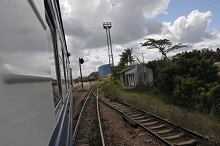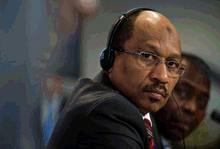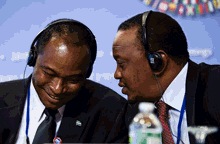
Typical street scene in Santa Ana, El Salvador. (Photo: iStock)
IMF Survey: More Trade Within Africa Offers Route to Faster Growth
October 9, 2010
- Boosting trade between African countries requires better infrastructure
- Africa’s potential can be fully realized only through more foreign investment
- Africa needs to strengthen gathering of its economic statistics
Increased intraregional trade and greater investment in infrastructure offer the countries of Africa direct routes to faster economic growth, African finance ministers said.

Train leaves Dar es Salaam, Tanzania: East African countries are improving infrastructure to boost regional trade (photo: Guo Chunju/Xinhua)
AFRICAN FINANCE MINISTERS
A panel of four finance ministers told a news conference that boosting trade between African countries would require higher spending on roads, railways, and bridges.
Addressing reporters during the IMF-World Bank Annual Meetings in Washington, the ministers said there is a widening and deepening of global interest in Africa. The continent may account for a small percentage of global GDP, but Africa’s high growth rates heralded a possible role as a much larger player in the world economy.
“One of the ways we can take advantage of the rebound in Africa is through increased regional trade,” Kenyan Finance Minister Uhuru Kenyatta said. “One of the reasons countries in the East African Community were able to be resilient despite the downturn in demand for our products from the developed countries was the increase in regional trade that took place.”
Common market
Kenyatta said regional authorities are working toward further strengthening trade between their countries. “We have a common market that has been in place since July 2010, and we are also working to improve infrastructure so that this increased intraregional trade can continue,” Kenyatta stated.
Sierra Leone’s Finance Minister Samura Kamara endorsed the importance of higher spending on infrastructure. “We want to devote a lot of our resources to the achievement of higher growth, and in so doing we are looking at infrastructure development,” Kamara said.
Finance Minister Mohamed Bacar Dossar said Comoros has tried to promote foreign investment in the country, particularly with Arab world, where Comoros has cultural and historical links. “These efforts led to a donors conference in March 2010 that generated pledges totaling $350 million in financing and investment for the Comoros. It also held out the prospect of projects to improve infrastructure,” he added.

Mohamed Bacar Dossar (l) of Comoros,
with Albert Besse of the
Central African Republic, at
African finance ministers news conference
(IMF photo)
Albert Besse, Finance Minister of the Central African Republic, said debt relief has released resources for the country’s fight against poverty. He said the authorities are also addressing many needs in the social sector in the areas of health and education, and supporting investment in major infrastructure projects such as roads and electricity supply.
Foreign investment
Kenyatta said Africa’s potential can be fully realized only through increased foreign investment. “An agenda of propelling investment and job creation could be part and parcel of the global economic recovery,” he added.
Kenyatta noted the Kenyan government is enacting measures to support the private sector. “As a country we are strongly and firmly on the path that growth must be private sector-led,” he declared.

Samura Kamara of Sierra Leone (l),
Uhuru Kenyatta of Kenya at
African finance ministers news conference
during IMF-World Bank Annual Meetings
(IMF photo)
Kamara said Africa had to work harder to attract more investment from the growing global interest in Africa. “There are two approaches: we can do it individually as separate countries … or we can use an integrated approach. Africa has a lot of regional groupings and we can work within those groupings,” Kamara said.
Informal sector
Kenyatta said Africa needs to strengthen the gathering of its economic statistics. But he observed that the formal sector in many African countries does not take into account the informal sector, which is one of the largest sources of employment.
“Together with the central bank we are working on a process of financial inclusion by mainstreaming into the formal sector some people who are actively engaged in the informal sector,” Kenyatta said. “This will allow us to capture a lot of people who are not being included in the formal statistics that we are currently using.”
The ministers also said their governments are allocating a higher priority to ensuring food security, including investments in water supply and irrigation.


